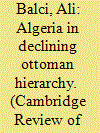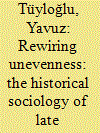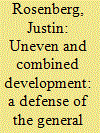| Srl | Item |
| 1 |
ID:
186295


|
|
|
|
|
| Summary/Abstract |
The shattering Ottoman order in the early nineteenth century offers an intriguing puzzle about the behaviors of subordinates within declining hierarchical orders. While Greece, Egypt, and many other provinces challenged the Porte, Algiers preferred to remain within the Ottoman order. The puzzle turns into a riddle when considering that Algeria was bounded to the center in a loose way and uprising against the Porte was less risky and less costly. Why did a geographically remote and loosely integrated subordinate remain within the Ottoman hierarchical order at a time when well-integrated and geographically close subordinates, one after another, picked the challenge option? This paper proposes three factors, which may be more generally applicable to the clients of declining patrons: the inability of the Porte to force Algeria against its interests, which decreased the costs of continued allegiance; Algeria’s need for a balancer against threats from European naval powers, which the Porte provided; and the domestic political legitimacy that allegiance to the Porte also provided to Algeria’s rulers.
|
|
|
|
|
|
|
|
|
|
|
|
|
|
|
|
| 2 |
ID:
186294


|
|
|
|
|
| Summary/Abstract |
Why did Britain intervene in Libya in 2011? Several explanations suggest themselves: security, R2P and status. The article shows that status was a significant motivating factor, and this demonstrates a dynamic that helps to refine a classical realist theory of intervention. The article calls for status to be seen intrinsically and instrumentally, and for more attention to be paid to the related motive of revenge. The findings suggest (though do not prove from a causal standpoint) that status may be a stronger motive than security for state decision-makers. The article’s central empirical argument is that regime change in Libya was not the last stage of Britain’s foreign policy of intervention. Rather, intervention was the last stage in Britain’s status and revenge-driven foreign policy of regime change. Britain saw the Libya crisis as a chance to preserve its great power status and revenge Muammar Gaddafi for past wrongs.
|
|
|
|
|
|
|
|
|
|
|
|
|
|
|
|
| 3 |
ID:
186296


|
|
|
|
|
| Summary/Abstract |
The events that took place in Afghanistan after the withdrawal of US troops on 30 August 2021 turned one imagination of things to come into a reality. In this forum on Nivi Manchanda’s Imagining Afghanistan: The History and Politics of Imperial Knowledge, three reviewers of the volume give their thoughtful and insightful views at a time when the situation in Afghanistan remains deeply concerning. Manchanda’s important book received honourable mention for the Francesco Guicciardini Prize for Best Book in Historical International Relations, from the International Studies Association (ISA) Historical Section (HIST) last year, in 2021. The book was also awarded the L.H.M. Ling Outstanding First Book Prize by the British International Studies Association. Manchanda’s intervention remains timely and significant to highlight and discuss.
|
|
|
|
|
|
|
|
|
|
|
|
|
|
|
|
| 4 |
ID:
186291


|
|
|
|
|
| Summary/Abstract |
Social theories of International Relations (IR) are normally premised on a deep distinction between public and private spheres. Whether articulated as ‘capitalism’, ‘the market’, or ‘civil society’, all attribute some analytical priority to the private, with explanatory significance for the public sphere and therefore also central to the critique of realism in International Relations. Liberalism in particular sees the source of peace as a flourishing private sphere that narrows the scope of the otherwise violent, war-prone orientation of the public which defines states. However, we argue that this orientation is ill-equipped to grapple with the world-historical significance of the ‘Rise of China’ that is better understood instead as a form of industrialism not premised on the public/private distinction. This inapplicability of categories foundational to liberal IR theory leaves it unable to meaningfully engage the Rise of China debate. Using Uneven and Combined Development (U&CD), this paper elaborates industrialism as a pattern of state-led development in China that prioritises industrial capacity as an end over strictly private objectives (e.g. profits). Arising in substantial part from the exigencies of political multiplicity, industrialism seeks national unity and vindication of a distinct civilisational identity through the pragmatic means of industrial capacity under conditions of modernity. Whilst this argument partly echoes the developmental state literature, it goes further by visualising this across both the longue durée and the current conjuncture, right up to the much-discussed Belt and Road Initiative. Finally, the argument emphasises U&CD’s potential to originate a simultaneously non-liberal and non-realist account of the implications of China’s rise.
|
|
|
|
|
|
|
|
|
|
|
|
|
|
|
|
| 5 |
ID:
186299


|
|
|
|
|
| Summary/Abstract |
The pleasure derived from reading your own work through the work of scholars you admire greatly is unique. I read Gargi Bhattacharya, Randy Persaud and Lucian Ashworth’s review of Imagining Afghanistan with much anticipation and also a little frisson of anxiety – what if they hated it? These are academics whose scholarship and mentorship has shaped my thinking, whose opinion matters to me; not some strangers pontificating about the limits and merits of a text from a distant ivory tower. My first emotion was a sigh of relief but as I sat with their respective pieces, unsurprisingly, I learned from them. Below I briefly delineate how their reflections have informed my thinking around the next big project I am working on.
|
|
|
|
|
|
|
|
|
|
|
|
|
|
|
|
| 6 |
ID:
186292


|
|
|
|
|
| Summary/Abstract |
Echoing the theory’s original application by Leon Trotsky, the empirical scope of the recent scholarship deploying uneven and combined development (UCD) has been largely confined to the consequences of unevenness between modern Europe and the non-European world. This article seeks to enrich the causal portfolio of UCD by ‘rewiring’ that primary unevenness of the modern period via ‘Eastern circuits’ of secondary unevenness. It argues that primary unevenness and its resultant European whip of external necessity should be conceptualized beyond the singular linear cause-and-effect trajectory running from the ‘West’ to the ‘Rest’. For fastening the empirical dynamism of unevenness to static ‘civilizational’ scales does disservice to the neo-Trotskyist ambition toward empirically recovering the multilinearity of development.
|
|
|
|
|
|
|
|
|
|
|
|
|
|
|
|
| 7 |
ID:
186297


|
|
|
|
|
| Summary/Abstract |
Long ago I imagined writing a book called ‘why the War on Terror is really about sex’. I was not trying to be facetious, although that project changed a lot before it saw an audience.
|
|
|
|
|
|
|
|
|
|
|
|
|
|
|
|
| 8 |
ID:
186298


|
|
|
|
|
| Summary/Abstract |
Nivi Manchanda’s Imagining Afghanistan: The History and Politics of Imperial Knowledge, provides a methodologically sound (discourse analysis), theoretically sophisticated (Postcolonial and decolonial), and historically grounded (archival) examination of the multiple ways in which Afghanistan has been an object of scholarly production, geopolitical maneuvers, and ultimately, of unremitting foreign domination. In what follows, the central claims and propositions of the book are examined, with emphasis on the ‘theory-policy’ nexus emanating from multiple academic disciplines.
|
|
|
|
|
|
|
|
|
|
|
|
|
|
|
|
| 9 |
ID:
186293


|
|
|
|
|
| Summary/Abstract |
Global monetary hierarchies have recently been posed by Kai Koddenbrock as a challenge to the concept of uneven and combined development (UCD) and its corollary of societal multiplicity and interactivity, suggesting that this approach obscures transnational or global-systemic dynamics. International money and finance represent an arguably autonomous and theoretically unaccounted for dynamic within the UCD framework that escapes the frame of multiplicity. Although international finance and money have not been wholly absent from UCD accounts of the dynamics of capitalist globalisation and its geopolitics, these have tended to be conceptualised as an outgrowth of the processes of industrialisation that are seen to be the primary driver of UCD. Does this represent a theoretical challenge or a lacuna? Money and finance were central to some of the earliest critical attempts to make sense of the conflagrations of the early twentieth century as products of capitalist development. I argue that clarifying and expanding the role of money and finance provides necessary foundations for a critical theory of international relations grounded in UCD.
|
|
|
|
|
|
|
|
|
|
|
|
|
|
|
|
| 10 |
ID:
186290


|
|
|
|
|
| Summary/Abstract |
This article responds to criticisms of the current revival of Uneven and Combined Development (UCD), particularly those aimed at the idea of a ‘general abstraction’ of UCD. Three main charges have been pressed: that UCD is not a real theory; that its transhistorical extension has reduced it to an unhistorical reification; and that its language of ‘advanced’ and ‘backward’ betrays its enduring Eurocentric foundations. The article argues not only that UCD can be defended, but also that it is the general abstraction which enables UCD to make its strongest contributions to solving problems of theoretical insufficiency, ahistoricism and Eurocentrism in social thought more generally. Finally the article ends by speculating on the reason why the much-maligned general abstraction of UCD should turn out to be of such significance.
|
|
|
|
|
|
|
|
|
|
|
|
|
|
|
|